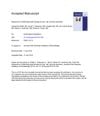Reply to: Response to 'Rethinking Biotin Therapy for Hair, Nail, and Skin Disorders'
August 2018
in “
Journal of the American Academy of Dermatology
”
TLDR Biotin treatment for hair, nail, and skin disorders has weak evidence and should not be recommended unless new research shows clear benefits.
In a letter to the editor, the author acknowledges the interest in their commentary on the use of biotin for hair, nail, and skin disorders, which concluded that biotin treatment for these conditions is largely unfounded or based on weak evidence such as case reports or small case series. The author notes that while some literature suggests biotin may improve certain hair conditions, the evidence is not strong, particularly for alopecia areata, which can improve spontaneously. The author references three clinical trials with varying results: one with 19 alopecia totalis patients showing some hair regrowth after biotin treatment but with unclear causation, another with 75 children on valproic acid where only 2 of 6 patients with a rash and hair loss showed improvement after biotin treatment, and a third with no significant laboratory differences but with 3 patients experiencing hair loss resolution after biotin administration. The author concludes that while biotin may have a role in treating hair loss where biotin deficiency is documented, the evidence is weak and laboratory testing for biotin levels is costly and likely to benefit only a small subset of patients. Therefore, dermatologists should advise against biotin supplementation for hair loss unless new trials show a convincing benefit.



